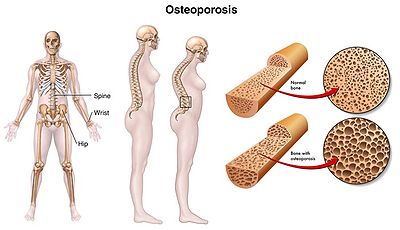Osteoporosis
From Wikiwel
See also : Back Pain
Home remedies
- keep the acidity low in your body (see : acid/alkaline balance): when your body is too acidic, it can't use or absorb vitamins and minerals from supplements or from your food.
- calcium and vitamin D usually increase bone mineral density and reduce the risk for hip fracture dramatically.
- Vitamin B12 : menopausal women who increase their vitamin B12 intake can assist in the maintenance of healthy bones.
- Proper Calcium Mineralization depends upon Vitamin D3 and Vitamin K2 : Calcium belongs in our bones, not in our blood. When our vitamin K2 levels are low, calcium collects in our blood and can lead to calcification in our arteries.
- vitamin K is also beneficial in protecting the bones from fractures and in helping women in their menopausal stage from having unhealthy bones.
- Vitamin D, a fat soluble vitamin, is beneficial in the metabolism of calcium and phosphorus in the body, together with parathyroid hormones. While parathyroid hormones are responsible for reabsorption of calcium and phosphorus during times when the blood is depleted of calcium, vitamin D does the opposite. When there is too much calcium in the blood, vitamin D allows the calcium and phosphorus to combine and be stored in the bone structure, allowing the bone to become much stronger.
- Boron plays a very important role in minimizing the risks of osteoporosis and arthritis : The bone building capacities of boron are often ignored in favor of calcium. However, it is boron that works in unison with calcium to strengthen the bones
- The bones also need a good mix of essential minerals and fatty acids for healthy bone function. This includes plant-derived magnesium and silica as well as animal forms of saturated fat and the long-chain omega-3 fatty acids EPA & DHA.
- Prevention of Osteoporosis : Bamboo + Alfalfa
- Potassium : Metabolic acids are somehow largely neutralized by potassium compounds or potassium salts.
- Plums can prevent bone loss…and even restore bone that’s lost through aging
- Magnesium : Almost 60 percent of the dietary magnesium is located and stored in the bones, and the muscles and tissues have the rest.
- Strontium : In laboratory research, scientists have found that strontium ranelate (a form of strontium registered as a prescription drug in many countries) may help increase bone formation by promoting the growth of osteoblasts (a type of bone-forming cell).In addition, laboratory studies suggest that strontium ranelate may help protect against breakdown of bone (a process known as "bone resorption").
- consuming adequate protein, less sodium, and more magnesium and potassium is a great way to protect bone health.
- physical activity, specifically a combination of aerobic, strength, balance, and flexibility exercises.
- Dried plums shown to be effective against fractures and osteoporosis.
- The lycopene in tomato juice can help prevent osteoporosis.
- Drink alternatives to milk : Milk has an acidifying effect on your body. Even though milk contains 300 mg of calcium in one cup, unfortunately, the net result is a calcium deficit in your bones.
- Alternatives to milk : rice milk is a delicious alternative to milk. And unsweetened fermented or cultured dairy products such as yogurt, kefir, and sour cream are okay to enjoy.
- Don't smoke : smoking increases risk of getting osteoporosis.
- Horsetail - Abundant in silicon and magnesium, this is a top notch herb for reinforcing connective tissue, teeth and bones. Used as a tea twice per day, horsetail helps reverse periodontal bone loss while encouraging rapid mending of fractures and breaks. It also facilitates calcium absorption. Only use spring gathered horsetail as mature varieties can irritate the kidneys.
- Nettle - Rich in calcium, magnesium, sulphur and protein along with vitamins C, D and K, nettle is a strong choice for bone health. One cup of infused nettle contains between 300-500 mg of calcium.
- Oat Straw : calcium-rich oat straw has been shown to heal osteoporosis, mend bones, improve cognitive performance—and even enhance sexual performance. Oat Straw is very high in Calcium and strengthens bones and teeth by stimulating cell growth.
- Pears reduces risk of osteoporosis : Boron found in pears aids the body in retaining calcium, which is necessary for strong bones.
- Onions : Rats fed with onions have shown a 20 percent decrease in the process of bone breakdown – the same effect caused by the calcitonin drug. This significantly means that onions can decrease the risk of developing osteoporosis.
- Small fish that are eaten with their bones on are good for you. Canned salmon and canned sardines are rich in calcium. Oily fish and mackerel also contain loads of Vitamin D.
- Lycopene may help in the prevention of osteoporosis.
- Horsetail : regular consumption of Horsetail extract along with a calcium supplement may be beneficial for osteoporosis, arthritis, and conditions caused by low bone density. It's suggested to stop taking Horsetail for one week after every one month of its regular use.
- Red Wine : drinking one or two alcoholic beverages…mainly wine…may improve bone health.The researchers suggest that the alcohol acts like estrogen in reducing bone turnover.
Medical Disclaimer
This information is not meant to be substituted for medical advice. Always consult a medical professional regarding any medical problems and before undertaking any treatment or dietary changes.
